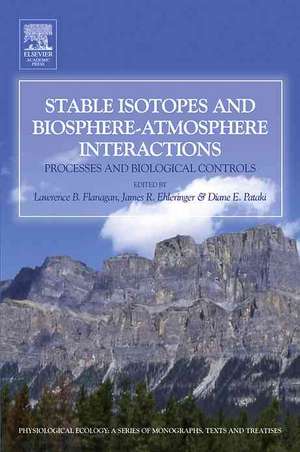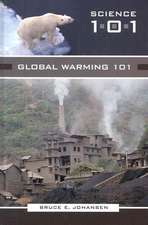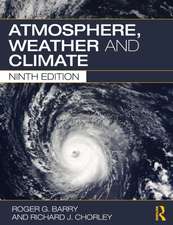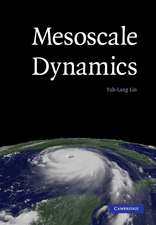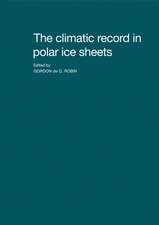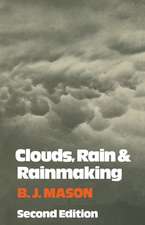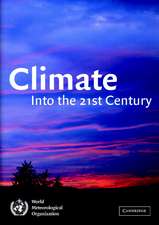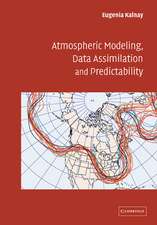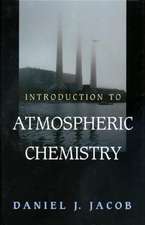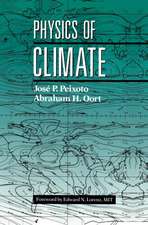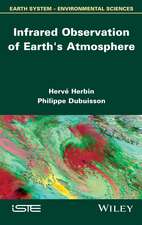Stable Isotopes and Biosphere - Atmosphere Interactions: Processes and Biological Controls: Physiological Ecology
Editat de Lawrence B Flanagan, James R. Ehleringer, Diane E Pataki Harold A. Mooneyen Limba Engleză Hardback – 15 dec 2004
Stable Isotopes and Biosphere - Atmosphere Interactions describes recent progress in understanding the mechanisms, processes and applications of new techniques. It makes a significant contribution to the emerging, multidisciplinary study of the Earth as an interacting system. This book will be an important reference for students and researchers in biology, ecology, biogeochemistry, meteorology, and atmospheric science and will be invaluable for anyone with any interest in the future of the planet.
- Describes applications of new stable isotope techniques to the emerging fields of earth system science and global change
- Illustrates advances in scaling of physiological processes from leaf/soil to the global scale
- Contains state-of-the-art, critical reviews written by international researchers and experts
Preț: 861.07 lei
Preț vechi: 1179.56 lei
-27% Nou
Puncte Express: 1292
Preț estimativ în valută:
164.76€ • 172.03$ • 136.36£
164.76€ • 172.03$ • 136.36£
Carte tipărită la comandă
Livrare economică 05-19 aprilie
Preluare comenzi: 021 569.72.76
Specificații
ISBN-13: 9780120884476
ISBN-10: 012088447X
Pagini: 400
Dimensiuni: 152 x 229 x 23 mm
Greutate: 0.72 kg
Editura: ELSEVIER SCIENCE
Seria Physiological Ecology
ISBN-10: 012088447X
Pagini: 400
Dimensiuni: 152 x 229 x 23 mm
Greutate: 0.72 kg
Editura: ELSEVIER SCIENCE
Seria Physiological Ecology
Public țintă
Plant physiologists, ecosystem ecologists, micrometeorologists, atmospheric scientistsCuprins
Introduction: Stable Isotopes and Earth System Science
Factors Affecting the Oxygen Isotope Ratio of Plant Organic Material
Stable Isotope Composition of Soil Organic Matter
Factors Determining the 13C Abundance of Soil-Respired CO2 in
Factors that Control the Isotopic Composition of N2O from Soil Emissions
Carbon and Hydrogen Isotopic Effects in Microbial Methane from Terrestrial Environments
Theoretical Examination of Keeling-plot Relationships for Carbon Dioxide in a Temperate Broadleaved Partitioning Ecosystem Respiration using Stable Carbon Isotope Analyses of CO2
Simulation of Ecosystem C18OO Isotope Fluxes in a Tallgrass Prairie: Biological and Physical Controls
Ecosystem CO2 Exchange and Variation in the d18O of Atmospheric CO2
Stable Isotope Constraints on Net Ecosystem Production under Elevated CO2
Stable Isotopes as a Tool in Urban Ecology
Terrestrial Ecosystems and Interannual Variability in the Global Atmospheric Budgets of 13CO2 and 12CO2
Remarks on the Use of 13C and 18O isotopes in Atmospheric CO2 to Quantify Biospheric Carbon Fluxes
Factors Influencing the Stable Isotopic Content of Atmospheric N2O
The Carbon Isotopic Composition of Atmospheric Methane and its Constraint on the Global Methane Budget
Factors Affecting the Oxygen Isotope Ratio of Plant Organic Material
Stable Isotope Composition of Soil Organic Matter
Factors Determining the 13C Abundance of Soil-Respired CO2 in
Factors that Control the Isotopic Composition of N2O from Soil Emissions
Carbon and Hydrogen Isotopic Effects in Microbial Methane from Terrestrial Environments
Theoretical Examination of Keeling-plot Relationships for Carbon Dioxide in a Temperate Broadleaved Partitioning Ecosystem Respiration using Stable Carbon Isotope Analyses of CO2
Simulation of Ecosystem C18OO Isotope Fluxes in a Tallgrass Prairie: Biological and Physical Controls
Ecosystem CO2 Exchange and Variation in the d18O of Atmospheric CO2
Stable Isotope Constraints on Net Ecosystem Production under Elevated CO2
Stable Isotopes as a Tool in Urban Ecology
Terrestrial Ecosystems and Interannual Variability in the Global Atmospheric Budgets of 13CO2 and 12CO2
Remarks on the Use of 13C and 18O isotopes in Atmospheric CO2 to Quantify Biospheric Carbon Fluxes
Factors Influencing the Stable Isotopic Content of Atmospheric N2O
The Carbon Isotopic Composition of Atmospheric Methane and its Constraint on the Global Methane Budget
Recenzii
"...quite suitable for reference and background information for individuals with advanced training and an interest in this topic...this text has excelled in uniformity of style and length. It is well edited, and the quality of illustrations is quite good...it would be a useful addition to most libraries and to most laboratories working with stable isotopes in the environment." --Mark Coyne, Department of Plant and Soil Science, University of Kentucky, for JOURNAL OF ENVIRONMENTAL QUALITY
"...the strength of this compiled volume comes from the varied topics covered, from plant physiology to global atmosphere budgets via a detailed examination of Keeling plots and their robustness...Stable Isotopes contains much up-to-date information about how the study of the stable isotopic content of atmospheric CO2, and N2O and CH4 has advances our current understanding of the biosphere-atmosphere gas exchanges and, thus, the global cycling of carbon and nitrogen...As such, Stable Isotopes will be useful to scientists, including graduate students, who wish to broaden their research to make use of stable isotopes, or those who already have expertise with a particular stable isotope but are unfamiliar with others." --Trends in Ecology and Evolution (2005)
"Flannagan et al. have successfully coalesced and integrated a large and multi-disciplinary group focused on a core set of problems related to measurement, interpretation, and modeling of the isotopic variation in trace gases at the ecosystem-atmosphere interface...a valuable reference for those interested in the powerful application of stable isotopes to these problems as well as a guidepost for future efforts...The illustrations and figures are professionally produced and displayed. Each chapter presents an effective balance of background information with recent or new data. The body of work represents another important milestone in the evolution of the isotope technique to the ever-expanding field of ecological science." --David G. Williams, University of Wyoming, for ECOLOGY
"...the strength of this compiled volume comes from the varied topics covered, from plant physiology to global atmosphere budgets via a detailed examination of Keeling plots and their robustness...Stable Isotopes contains much up-to-date information about how the study of the stable isotopic content of atmospheric CO2, and N2O and CH4 has advances our current understanding of the biosphere-atmosphere gas exchanges and, thus, the global cycling of carbon and nitrogen...As such, Stable Isotopes will be useful to scientists, including graduate students, who wish to broaden their research to make use of stable isotopes, or those who already have expertise with a particular stable isotope but are unfamiliar with others." --Trends in Ecology and Evolution (2005)
"Flannagan et al. have successfully coalesced and integrated a large and multi-disciplinary group focused on a core set of problems related to measurement, interpretation, and modeling of the isotopic variation in trace gases at the ecosystem-atmosphere interface...a valuable reference for those interested in the powerful application of stable isotopes to these problems as well as a guidepost for future efforts...The illustrations and figures are professionally produced and displayed. Each chapter presents an effective balance of background information with recent or new data. The body of work represents another important milestone in the evolution of the isotope technique to the ever-expanding field of ecological science." --David G. Williams, University of Wyoming, for ECOLOGY
